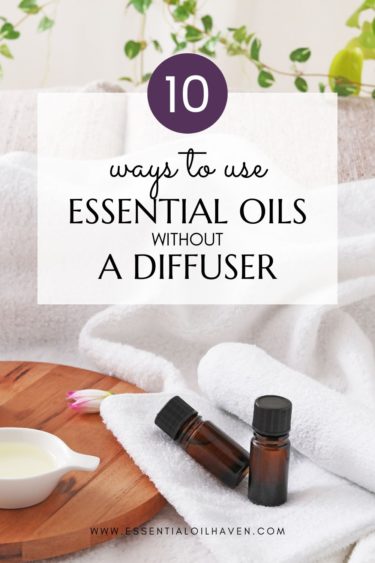 So you’re here to learn how to use your essential oils without a diffuser. I totally get it! I’ve been using essential oils for more than 10 years. Sometimes, you simply don’t want to use a diffuser.
So you’re here to learn how to use your essential oils without a diffuser. I totally get it! I’ve been using essential oils for more than 10 years. Sometimes, you simply don’t want to use a diffuser.
Or maybe you’ve gotten your essential oils starter kit, but it didn’t include a diffuser. Do you go out and buy an aromatherapy diffuser on its own? There are many cute options under $40.
But really, you don’t need to buy a diffuser to enjoy the benefits of essential oils. There are plenty of ways you can use your oils without a diffuser.
Or you can’t. Maybe it’s because you’re travelling, you’re away from home for the day, or you’re stuck in the car during rush hour traffic and really need that boost of aromatherapy benefits.
In this post, I’ll teach you how to use essential oils without a diffuser.
1. Diffuser Jewelry
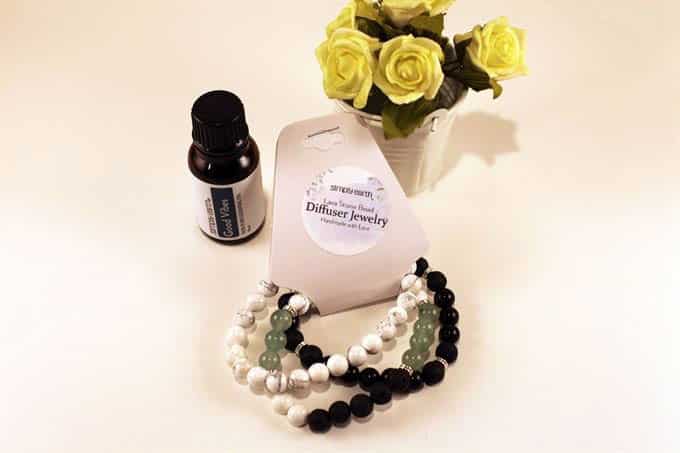
Beautiful diffuser bracelet set from Simply Earth
Get it Here
Necklaces, bracelets, keychains, earrings – jewelry can be diffusers, too! My favorite are bracelets, as they are easy to match to any outfit, and quick to move up to your nose to take an extra sniff of your essential oils. That way, you get to keep the aromas close as you inhale them throughout your day.
Many places sell diffuser jewelry as part of their line of accessories.
Diffuser jewelry needs just a few drops (1-3 drops) of your essential oil of choice.
How long the aroma lasts would depend on the type of essential oil mixture. Of course, you can always re-apply the oils on your jewelry.
Diffuser bracelets, car diffusers, or necklaces are definitely gift-worthy as well. Check out this cute leather one here, or a locket necklace (I have this one here).
2. Massage Oils
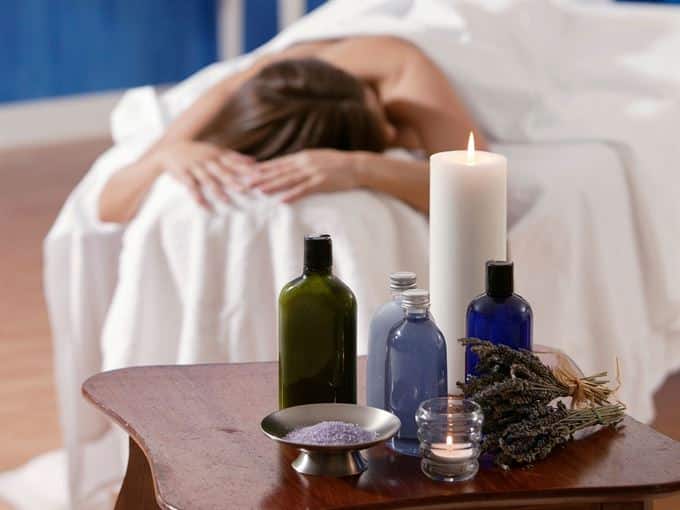
Using essential oils in a massage is very popular for home treatments.
Making massage oils at home is not as hard as you might think!
You’ll simply need some carrier oils of choice (jojoba oil, fractionated coconut oil, or sweet almond oil are popular); and your favorite essential oils. Please never put essential oils directly onto the skin.
Here are 15 recipes that use essential oils to create relaxing and aromatic blends.
3. Candles
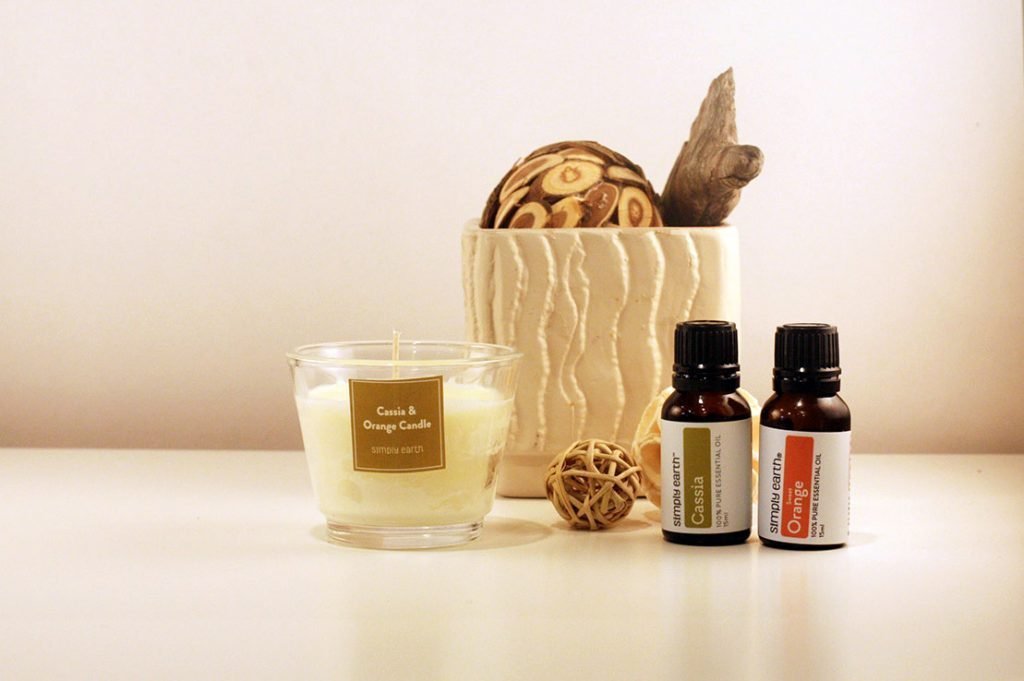
DIY essential oil candle
Scented candles never get old. Aside from the soft glow ambiance and the calming mood they bring about, the aroma definitely adds that extra touch to the overall setting.
Add 10-20 drops of your favorite oil and mix it with a base note essential oil, such as Patchouli or Vetiver. The presence of the base note oil will give your candle a more lasting aroma. Add the blend to your candle and spread it over the entire area apart from the wick. Leave it for at least an hour for the oil to absorb. Then, you may light the scented candles.
While this method is perfect for diffusing essential oils for an aromatherapy bath, I do not recommend using oil candles or heating burners for strictly therapeutic purposes. Heat will alter the therapeutic properties of your oils, so use it just for the nice smell and relaxing atmosphere.
4. Directly from the Bottle
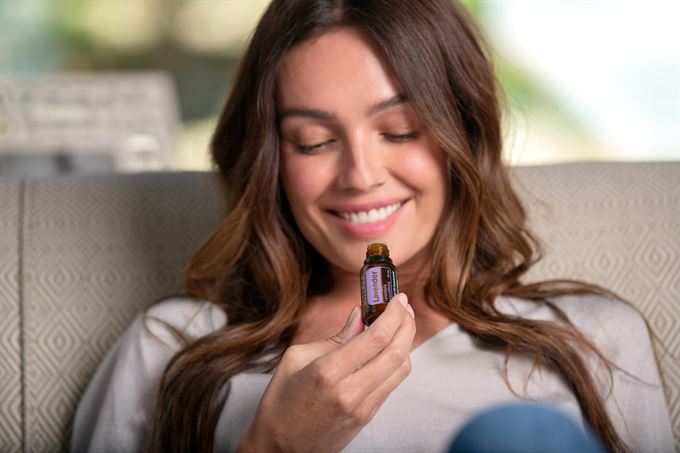
Smelling essential oils directly from the bottle totally works for a quick aromatherapy boost!
If you’re in a rush and don’t have an essential oil roller bottle at the ready, simply grab your oil and sniff it!
I’ve done this many times for helping with nausea, headache, or getting a boost of energy. For those cases, I used Lemon essential oil. Open the essential oil bottle, hold it under your nostrils, and take 3 deep breaths in & out.
Our sense of smell is one of the fastest pathways for aromas to reach our brain. Smelling essential oils directly out of the bottle is especially useful as a quick way to support emotional balance.
5. Essential Oil Spray
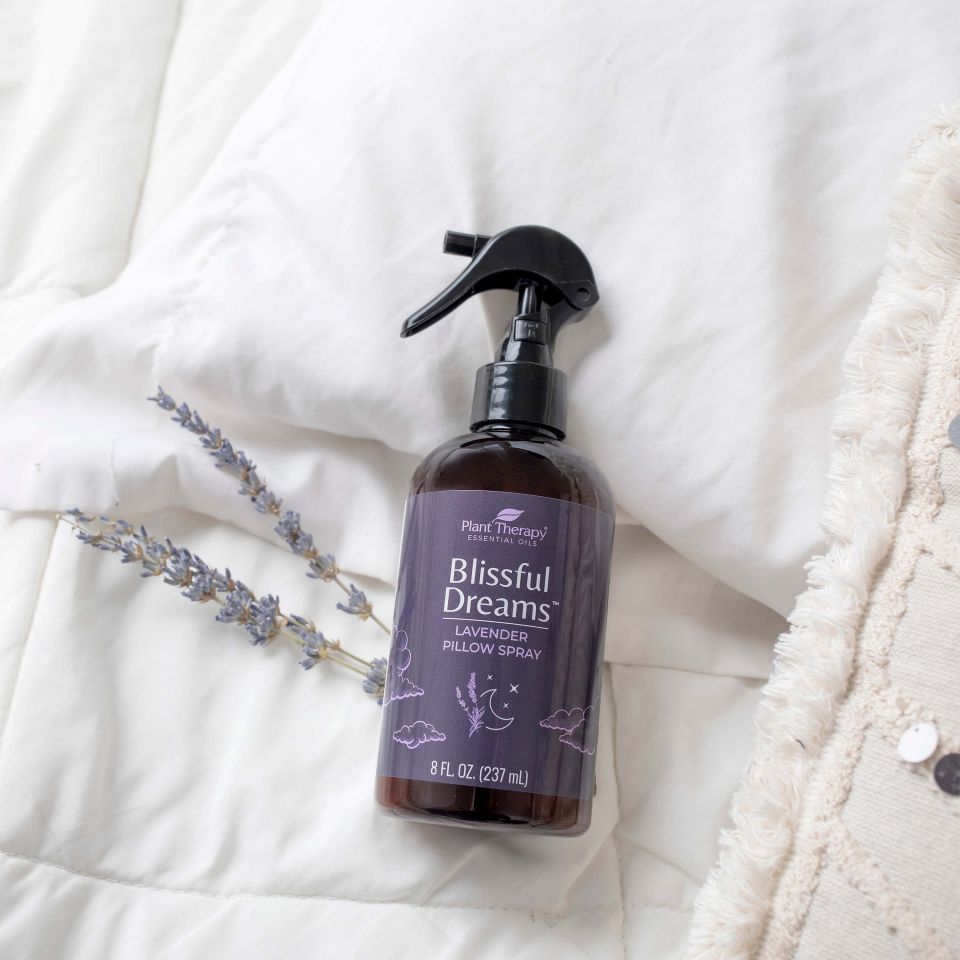
Use a pillow spray with essential oils
Blissful Dreams Spray
Plant Therapy sells a beautiful “Blissful Dreams” Lavender Pillow Spray, offering an easy way to enjoy essential oils without a diffuser.
You can also make a homemade air freshener by filling a basic 2oz spray bottle with distilled water, then adding 10-15 drops of your favorite essential oil.
This do-it-yourself essential oil spray is an organic way to freshen up your surroundings, without the use of the artificial fragrance from aerosols.
To use, simply mist the air as desired. I most often use my spray to eliminate odors in the kitchen and in the car.
6. Body Lotion

Treat your skin with care after a shower. Use essential oils in your body lotion.
Another way to use essential oils without a diffuser is by adding them to lotion or moisturizer. This way, you can enjoy the benefits of the oil while also keeping your skin hydrated. This is one of my favorite tips on how to get the most out of your oils.
At night time, I use calming essential oils that help me relax and unwind. If I use body lotion in the morning, I reach for more uplifting blends to add to the lotion.
During summer months, please beware of photosensitivity in oils. Choose oils for your lotion that don’t irritate the skin when exposed to sunlight.
7. Cotton Round
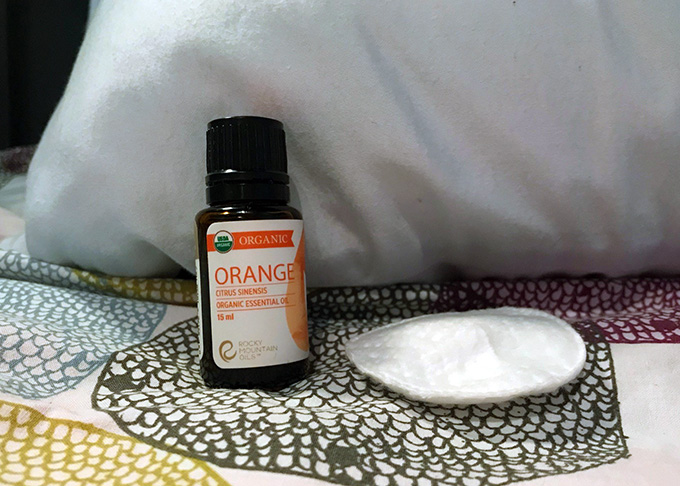
A simple cotton round is a cheap passive diffuser!
Another way to use essential oils without a diffuser is to add a few drops to a cotton round or tissue – yes, the ones we use to take off make-up.
Place a 2-3 drops on it and let the aroma fill your room. It’ll last around 2-3 hours. I sometimes do that and put it on my keyboard when I work at the computer – to increase focus or take off the edge of a headache. It’s the quickest and cheapest way.
You can also put it in your pillowcase. This is great for relaxation before bedtime or if you’re feeling stuffy from a cold.
Cotton balls with drops of your favorite essential oil is also an effortless way to freshen up your dank cabinets and your musky closets. Add 2-3 drops of oil onto the cotton, and place where needed.
8. Toilet Paper Roll
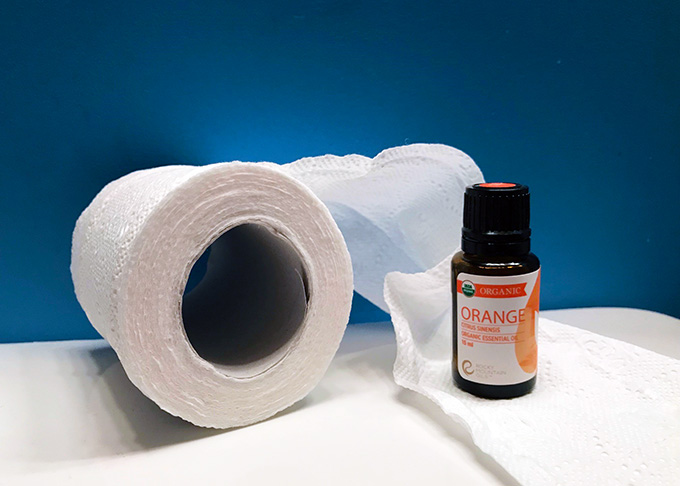
Add a few drops of essential oils to the inside of your toilet paper roll for a quick bathroom refresh.
This method is a great idea, especially if you are expecting visitors at your house. On the inside of your toilet paper roll, put a few drops of essential oils, then place it back in its dispenser. When the visitor goes to your bathroom, a whiff of fresh aromatherapy air will fill the room.
9. Personal Inhalers
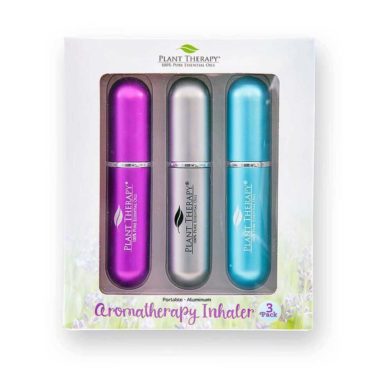
3 Pack of Aromatherapy Inhalers
Get them here
Personal inhalers are your very own portable aromatherapy refuge. During unfortunate occasions when you feel dizzy or unwell, grab your first-aid personal inhaler. Inhalers are available at very affordable prices, so you could easily get one. Then, just add about 15 drops to the cotton pad. It may be less or more, depending on your preference.
10. Passive Diffusers
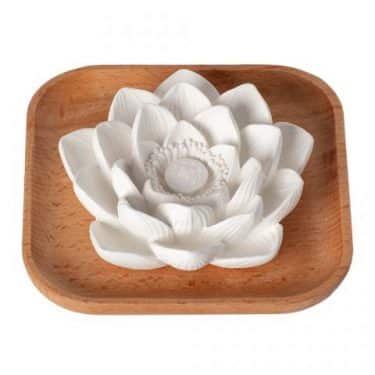
This Lotus Diffuser from Plant Therapy is less than $15.
Get it here
A passive diffuser uses a material to absorb essential oils, and then releases them into the air over time. This type of diffuser is very easy to use and can be placed almost anywhere in your home or office. It doesn’t require heat or electricity – it even works while camping!
Passive diffusers are an affordable and convenient way to diffuse essential oils without needing an ultrasonic diffuser. Plus: they make a great gift for any essential oil lover in your life.
Terra cotta diffusers are also a type of passive diffuser. They don’t take water and let you re-apply oils as needed. You can get a simple stone (this one here), or again some jewelry with terra cotta (such as this leather bracelet here) or also figurines or a multitude of other designs if you keep searching around on Amazon.
Final Thoughts
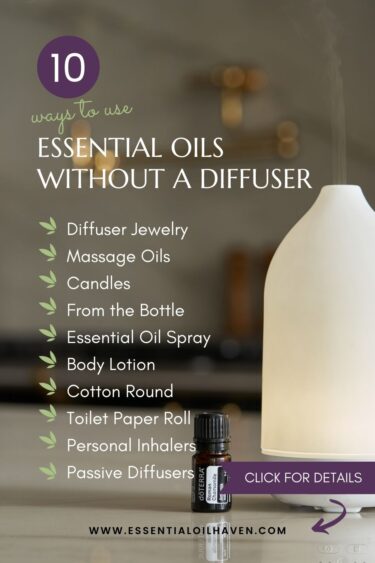
I hope you enjoyed my simple and creative ways of using essential oils without a diffuser.
These are just a few ideas, of course, and the possibilities are endless when it comes to using essential oils without a diffuser. If you have more ideas, feel free to comment below and let me know!
If you liked these alternatives to diffusing, please pin it on Pinterest or share this article with your friends.
And if you now have decided that you do instead need a diffuser, browse my list of best diffusers under $40 here, or check out the diffuser I’ve been running for years, the Diamond Diffuser from Edens Garden.
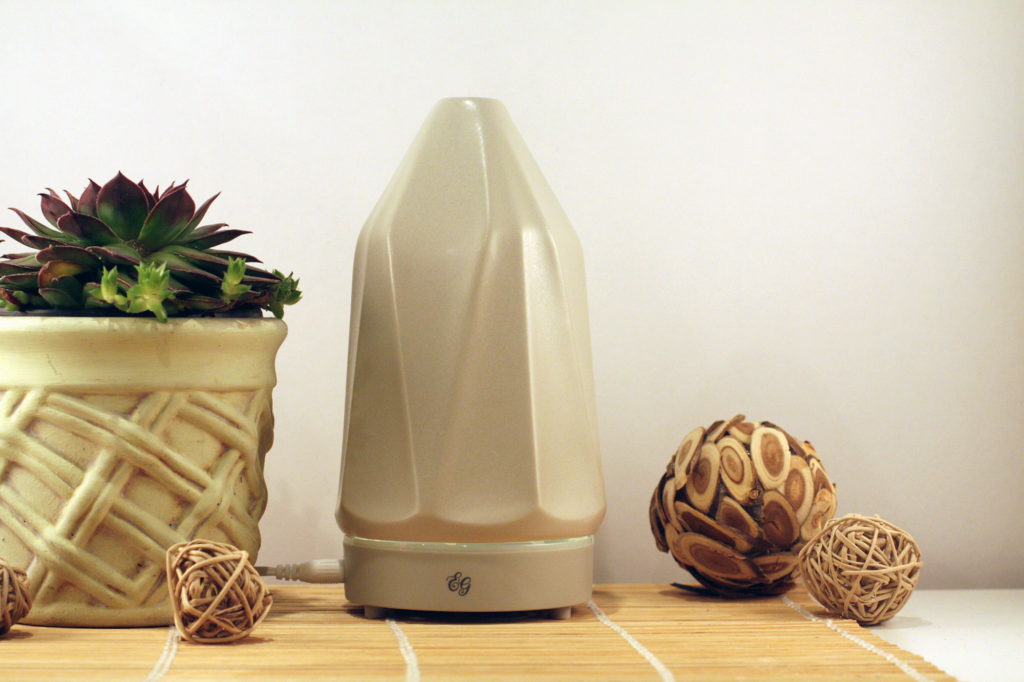
Diamond Diffuser, Tan Colour, from Edens Garden
Get it Here






Lea
Hi Emma, thank you for all of this helpful information. I’m new to essential oils and didn’t know that citrus oils shouldn’t be used in a diffuser. My diffuser seems fine, is it OK to keep using it?
When I use a diffuser in small rooms the scent fills the air but not so much in bigger rooms. Would two or three diffusers be needed in larger rooms? Is there a rule of thumb to follow such as a certain number of diffusers per square foot?
Emma Carter
Hi Lea, great questions! The recommendation around citrus oils is hard to answer as a blanket statement. Some oils may corrode some diffusers. It largely depends on the manufacturing quality of your diffusers, and the types of plastics used. It also depends on the quality of oil brand you’re using. So, it’s hard to tell! Personally, I prefer using citrus oils in a DIY air spray or other application, just to stay on the safe side of things.
Now about the large rooms, you can place one or two diffusers in the same room. However, I would personally just run one unit that is made to cover large spaces. These diffusers usually have a 300ml – 500ml water tank size. And when you’re adding drops to the water, you’ll need 12-20 drops per fill-up. I have a few more tips on how to best use your essential oil diffuser here, including placement options for best scent distribution.
Hope this helps!
Steph
I think that some of these oils are necessary to use without a diffuser. Thanks a lot for explaining the issue!